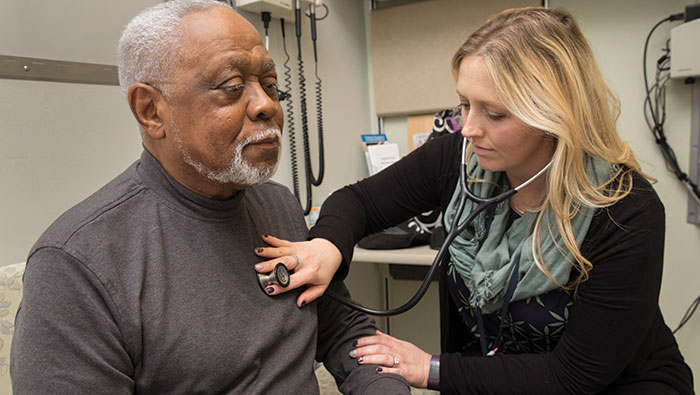
Advancements in health care save lives. But for some, barriers in access to medical care or timely diagnoses can prevent them from being cured. Additionally, populations with certain genetic traits or environmental exposures often experience disparities in effective care.
The Center for Precision Medicine at UC Davis seeks to better predict risk to health and responses to therapy by gathering and integrating complex and detailed information from multiple disciplines, such as genomics, epidemiology, microbiology, clinical information, and behavioral health, along with community engagement and proactive planning.
“Because people are diverse, one treatment may work great for a certain population, but not well for others,” explained Frederick Meyers, professor of internal medicine and hematology-oncology at the UC Davis School of Medicine. As director of the Center for Precision Medicine, he collaborates with colleagues across the university to promote research that informs improved care as well as to advocate for better access to quality, personalized care that will achieve improved outcomes for even the most difficult cases.
Precision medicine has the potential to improve the science of health by empowering individuals and communities to become partners in their own wellness. Technological advances and an increasing interest in health apps and mobile health tracking, smart homes and personalized genetic testing have led to data that could be used to better inform health decisions and the system of health care.
“With this science, we can look at multiple variables that affect health to draw better conclusions. This data can include toxic exposure, emotional states, sleep, diet, heart rate, labs and more to inform what will work best for individuals in a variety of situations,” said Meyers. “This is especially helpful for those who aren’t responding to traditional treatments or who fall into special groups that need a new standard of care.”
Now more than ever, patients and providers are empowered to tackle some of the most challenging health issues, from cancer and heart disease to traumatic childhood events.
Two federal programs are helping boost precision medicine research at UC Davis. The U.S. Department of Defense’s Precision Trauma Care Research initiative awarded $4.5 million to develop better, more precise treatments for patients with traumatic brain injury and other forms of trauma. And the All of Us study, funded by the National Institutes of Health, is part of a federal push to gather genetic, biological, environmental, health and lifestyle data from at least 1 million volunteers.
The Center for Precision Medicine will continue to act as a hub for education, research and policy. It will facilitate collaborative, multidisciplinary teams and train the next generation of health professionals in data science.
This is one of several Big Ideas, forward-thinking, interdisciplinary programs and projects that will build upon the strengths of UC Davis to positively impact the world for generations to come. Learn more at bigideas.ucdavis.edu.